- California Assembly OKs highest minimum wage in nation
- S. Korea unveils first graphic cigarette warnings
- US joins with South Korea, Japan in bid to deter North Korea
- LPGA golfer Chun In-gee finally back in action
- S. Korea won’t be top seed in final World Cup qualification round
- US men’s soccer misses 2nd straight Olympics
- US back on track in qualifying with 4-0 win over Guatemala
- High-intensity workout injuries spawn cottage industry
- CDC expands range of Zika mosquitoes into parts of Northeast
- Who knew? ‘The Walking Dead’ is helping families connect
Former comfort women accuse play of distortion
As two former comfort women make their way around the United States, controversy over the accuracy of a play depicting comfort women has risen.
Lee Ok-seon, 87, and Kang Il-chool, 86, have requested a revision of the play “Bongseonhwa,” which is slated to open Tuesday and Wednesday at Queens Theatre in New York.
The two women, who boycotted the play after seeing it performed in Glendale, Calif., on July 28, have accused the project of distortion, said the House of Sharing in Gwangju, South Korea, which provides housing for former comfort women, among them Lee and Kang.
Their boycott came during the one-year anniversary of the Glendale statue depicting a young comfort woman, causing a 40-minute delay in the event.
“The performance of ‘Bongseonhwa’ is a step back from the human rights activism of the former comfort women, and we officially request a modification of the inaccurate scene,” the House of Sharing said Saturday.
The house said the problematic scene depicts a comfort woman abducted by Japanese soldiers dressed in traditional Japanese clothing. In the play, she throws money in the air, which is collected into a sack by another comfort woman.
“The grandmothers saw the performance and said, ‘I’ve never worn such extravagant Japanese clothes or been handed money,’” the house said. “The portrayal of the suffering of the victimized women in that way may become abused by Japan. For foreigners who don’t speak Korean and who don’t understand the background of Korean history, it could cause a misunderstanding.”
“Bongseonhwa,” originally put on by the Seoul Metropolitan Theatre, is based on the novel “Mother’s Name Was Cho-Sen Ppi” by Yoon Jung-mo and depicts the life of a woman taken by Japanese soldiers to become a sex slave.
The Korean American Association of Greater New York plans to open the play at 8 p.m. at Queens Theatre on Tuesday and Wednesday.








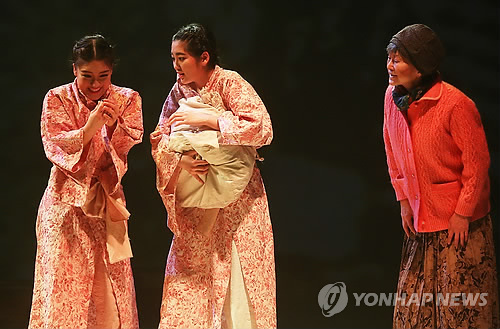
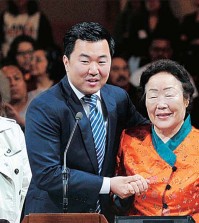
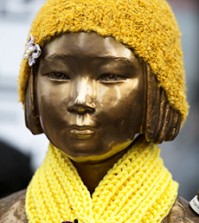
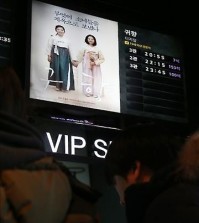
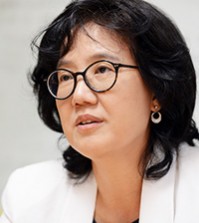





konohazuku001
August 5, 2014 at 5:28 AM
Based on these following facts,there was no Korean comfort-woman unwillingly kidnapped by Japanese army or officials.
1.No one knows the names of the villages or towns where the comfort-women were actually kidnapped.
2.So far as the comfort-women kidnapping issue is concerned, there is no obvious record which had been written before 1990s.
3.It is quite strange that so many as 200,000 victims had kept silence from 1945 to the 1990s.
4.A large amount of money were paid to the Comfort-women in reward for their jobs. Back in those days,it was not a rare case that poor parents necessarily sold their daughters to get money.
5.There have been no witnesses who can testify the kidnapping incidents. If there had been many comfort-women who were kidnapped, there must have been many witnesses. But nobody saw the incident.
6.There was no real testimony by the kidnappers. It was already proved that Seiji Yoshida’s testimony was absolutely false statements. At that time in Korea, most of policemen and officials were Koreans, not Japanese.
7.There was no protest opposing to the kidnapped comfort-women.If there had been kidnapped comfort-women as real events, riots must have been raised.
8.In Korea, from time immemorial to now ,there always have been many prostitutes. In the period of the World WarII,it is quite natural that there must have been prostitution markets there.
9.Most of Korean comfort-women say “I was sold.” or “I was deceived.” A small number of women say “I was kidnapped.” The credibility of their testimonies are in question. The contentions are rather suspect evidences.
10.Although The Japan-Korea Basic Relations Treaty was concluded in 1965, South Korea currently lodges various reasons in order to draw out as much money as possible from Japan.
However,at the time of the conclusion of the treaty, they never argued about the comfort-women issue at all.
moguro fukuzo
August 5, 2014 at 3:34 PM
They never received money? Their parents did.